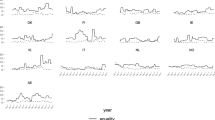Abstract
Many thousands of Chinese students come to ‘Western’ countries to study every year, and they probably include many of the country’s future leaders. We need to know how this might affect their social and political attitudes, and how it may influence China’s relationship with other major powers. There is good evidence that students who have returned from abroad (haiguipai) differ from students who remained in China, but this does not prove that going abroad changed their attitudes. This study tracks the attitudes of some Chinese students while they are abroad, and finds little evidence of change. We should be cautious about assuming that studying abroad substantially reshapes Chinese students’ political attitudes without further longitudinal evidence.
Similar content being viewed by others
Notes
These figures exclude Hong Kong and Macao; UNESCO does not present data for Taiwan.
To simplify the explanation, throughout this discussion I am assuming that the threshold for Type I error is fixed at p = .05
I mean this in the economic sense of ‘marginal utility’, not ‘unimportant’.
References
Amir, Y. 1969. Contact hypothesis in ethnic relations. Psychological Bulletin 71: 319–41.
Baussel, Russel Barker, and Yu-Fang Li. 2002. Power analysis for experimental research. Cambridge: Cambridge University Press.
Chen, J., and B. Dickson. 2008. Allies of the State. China Quarterly 196: 780–804.
Cohen, J. 1988. Statistical power analysis for the behavioral sciences, 2nd edn. Hillsdale NJ: Lawrence Erlbaum.
Converse, P. 1974. Comment: The status of nonattitudes. American Political Science Review 68(2): 650–60.
Han, D., and D. Zweig. 2010. Images of the world. China Quarterly 202: 290–306.
Han, D., C. Dingding, and F. Chanping. 2013. Images of the United States. China Journal of International Politics 6(2): 183–207.
Hu, H. 2011. The political economy of governing ISPs in China. China Quarterly 207: 523–40.
Johnston, Alastair Iain. 2004. Chinese Middle Class Attitudes Towards International Affairs: Nascent Liberalization? China Quarterly 179: 603–28.
Kalin, R., and J. Berry. 1980. Geographic mobility and ethnic tolerance. Journal of Social Psychology 112(1): 129–34.
Lam, Willy Wo-Lap. 2006. The Traits and Political Orientation of China’s Fifth-generation Leadership. In Challenges and policy programmes of China’s new leadership, ed. Joseph Cheng, 35–61. Hong Kong: City University Press.
Lamare, J. 1975. Using political science courses to inculcate political orientations. Teaching Political Science 2(4): 409–32.
Leonard, Mark, Small Andrew, and Rose Martin. 2005. British public diplomacy in the ‘Age of Schisms’. London: FPC.
Li, Cheng (ed.). 2005. Bridging minds across the pacific. Lanham: Lexington.
Li, C. 2006. Foreign-educated returnees in the PRC. Journal of International Migration and Integration 7(4)
Li, C. 2010. Shaping China’s foreign policy. Asia Policy 10: 65–85.
Lu, J. 2013. Democratic conceptions in East Asian societies. Taiwan Journal of Democracy 9(1): 117–45.
Murphy-Lejeune, Elizabeth. 2002. Student mobility and narrative in Europe. London: Routledge.
Nield, K. 2004. Questioning the myth of the Chinese learner. International Journal of Contemporary Hospitality Management 16(3): 189–96.
Nye, Joseph. 2004. Soft power. New York: Public Affairs.
Schmitter, P., and T.L. Karl. 1991. What democracy is and is not. Journal of Democracy 2(3): 75–88.
Tang, M. 2011. The political behaviour of the Chinese middle class. Journal of Chinese Political Science 16(4): 373–87.
Tang, M., D. Woods, and J. Zhao. 2009. The attitude of Chinese middle class towards democracy. Journal of Chinese Political Science 14(1): 81–95.
Tong, Caroline, and Hongying Wang. 2005. Sino-American Educational Exchanges and Public Administration Reforms in China. In Bridging minds across the pacific, ed. Li. Cheng, 155–76. Lanham: Lexington.
UNESCO. 2013. Global Flow of Tertiary-level Students. www.uis.unesco.org/Education/Pages/international-student-flow-viz.aspx.
Useem, John, and Ruth Useem. 1967. Western-educated man in India. New York: Dryden.
Wang, Y., R. Harding, and L.-W. Mai. 2012. Impact of cultural exposure on young Chinese students’ adaptation in a UK business school. Studies in Higher Education 37(5): 621–39.
Wilson, I. 2011. ‘What should we expect of ‘Erasmus Generations’?’. Journal of Common Market Studies 49(5): 1113–40.
Wilson, I. 2014. International Exchange Programs and Political Influence: Manufacturing Sympathy? New York: Palgrave Macmillan.
Wilson, I. 2015. ‘Exchanges and Peacemaking: Counterfactuals and Unexplored Possibilities’. All Azimuth Journal of Foreign Policy and Peace 4(2): 5–18.
World Values Survey. 2008. Online data analysis. http://www.wvsevsdb.com/wvs/WVSAnalizeQuestion.jsp.
Yan, K., and D. Berliner. 2011. An examination of individual level factors in stress and coping processes. Journal of College Student Development 52(5): 523–42.
Yang, M and S.H. Tan. 2006. Haigui in China’s nation-building and modernization, EAI background brief 315, available at http://www.eai.nus.edu.sg/BB315.pdf on 10/9/2015.
Zweig, David. 2002. Internationalizing China. Cornell: Cornell University Press.
Acknowledgments
I would like to thank Robert and Biddy Guy and the Universities’ China Committee in London, Thomas Jansen at the University of Wales, Lampeter (now Trinity St David’s), the International Office at the University of Aberdeen, the Centre for International Foundation Programmes at St Andrews, three anonymous reviewers and panelists at the 2014 Canadian Political Science Association Convention. All errors are, of course, my own.
Author information
Authors and Affiliations
Corresponding author
Rights and permissions
About this article
Cite this article
Wilson, I. Does International Mobility Change Chinese Students’ Political Attitudes? A Longitudinal Approach. J OF CHIN POLIT SCI 21, 321–337 (2016). https://doi.org/10.1007/s11366-015-9387-6
Published:
Issue Date:
DOI: https://doi.org/10.1007/s11366-015-9387-6




